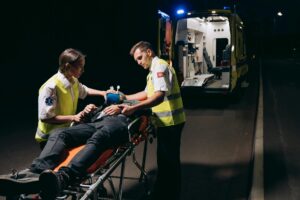
![]()

Statistics show that PTSD and depression are five times more common in first responders than the general population. About 85% of first responders report symptoms related to mental health conditions. Firefighters and police officers are more likely to die by suicide than while on duty.
The most common symptoms of PTSD are nightmares and flashbacks of distressing events. PTSD can also cause physical symptoms such as chronic pain, sweating, jitteriness, headaches, dizziness, and chest pain. Other PTSD symptoms include irritability, angry outbursts, sleep problems, and difficulty concentrating.
Because PTSD can cause such a wide range of symptoms, the treatment for this condition needs to be multi-pronged. Unfortunately, due to social stigma, first responders likely stems from an expectation from society, their agency, or themselves to be the calm, measured, strong, and fearless professional. Any attempt at seeking mental health support may be viewed as weakness.
There are several strategies that can help people learn how to manage and reduce, if not eliminate, such memories. At the Relationship & Intimacy Center, we have expert therapists that can help anyone work and manage these conditions. Some of them are trained or certified in Eye Movement Desensitization and Reprocessing (EMDR) Therapy. Visit our website to learn more about our therapists and how to schedule with us. We thank you for your work and we care for your wellbeing.
If you’re feeling the stress and effects of post-traumatic-stress disorder (PTSD), therapy with a specialized professional can help. An EMDR therapist can guide and validate you as you navigate the stresses of your professional life. In therapy, you’ll find a safe place to overcome stress, past difficult memories, and the impact of your stress on your relationships.
To find out more about how therapy can help First Responder Professionals, please reach out to us here.
![]()
